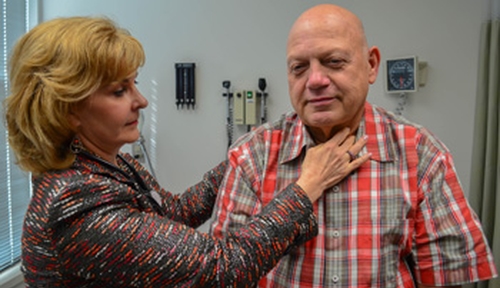Physicians had lost hope for 65-yearold Randy Whisnant of Morganton, N.C., advising him and his wife, Quteen, that it was time for hospice.
Quteen, however, refused to accept that nothing else could be done to stop the aggressive stage IV mantle cell lymphoma from spreading in her husband. Diagnosed in 2010, Randy had extensive chemotherapy and radiation, which only partially eliminated the cancer.
Then, one day a friend told her to take Randy to Nebraska.
“I immediately searched the Internet, found Dr. (Julie) Vose and left a message. I didn’t even know where Nebraska was.”
The next day, Randy’s disease took a serious turn. In the emergency room, three quarts of fluid (caused by tumors) were removed from his stomach. The physician recommended hospice.
Quteen held her ground. “We’re going to wait for the call from Omaha.”
When the call came, family and friends worried about logistics. There were tickets to buy and arrangements to make for motel and transportation. Quteen answered with dogged determination: “There’s always a way.”
Still, Nebraska felt like the end of the world for a couple who had never flown or ventured far from their home state. “Here we are in our 60s and now we’re traveling,” Quteen said.
When they arrived in Omaha, Randy couldn’t breathe well. His stomach was so swollen he couldn’t walk and he was confined to a wheelchair. Sleeping and lying down were problematic.
They met with Julie Vose, M.D., chief of the division of hematology and oncology and Neumann M. and Mildred E. Harris Professor. After an evaluation and tests, Randy qualified for an experimental drug study with Ibruitinib.
To participate, he needed medication, monitoring and tests every three weeks – up to 40 times over the course of treatment – in Omaha.
“This drug is so promising that the Federal Drug Administration gave it fast track designation, which rarely happens,” Dr. Vose said. “Patients who’ve been on the treatment have had remarkable results with limited side effects.”
Before its approval in November, the FDA had designated Ibruitinib as a breakthrough therapy. The designation is intended to expedite the development and review of drugs for serious or life-threatening conditions that demonstrate the drug may have substantial improvement over available therapy. UNMC was one of 18 sites in the U.S. testing the drug.
When Randy began taking the drug in February, he was wheelchair-bound. By his next visit to Omaha he was able to walk.
“Without this drug he wouldn’t be alive,” Quteen said. “The people are amazed that he’s doing so well and able to do things now. No one we saw in North Carolina knew about the experimental drug study for mantle cell.”
Meanwhile, all the tumors in Randy’s neck are gone and the ones in his stomach have shrunken.
Quteen, 62, is Randy’s rock. But, now her trips to Omaha are even more personal.
In September, breast cancer was discovered. “How will we do both cancers now?” she thought.
The surgeon in Ashville, N.C., wanted to do surgery, putting her out of commission for weeks.
“This was not what I wanted. I don’t mind being sick a few days, but weeks would not do.”
So, Quteen got on the Internet and read all she could about breast cancer. Along the way, she discovered UNMC oncologist Beth Reed, M.D., and a second opinion. “The doctors in Nebraska have a better outlook on this cancer. I trust them – they have my best interest at heart.”
Quteen finished chemotherapy at the end of November.
“My wife is going to keep me around,” Randy said. “She doesn’t want to break another one in.”
“I’m thankful there’s somebody out there trying to find different things to help people cause if I hadn’t have gotten the drug, I’d have been dead now. So far it seems to be working.
It gives me hope and I’m thankful for that.”
It’s a difficult time for the Whisnants and a challenge to travel, stay in motels and be away from home, family and friends. Yet, they persevere.
“God has his hands on us and we will make it,” Quteen said.
